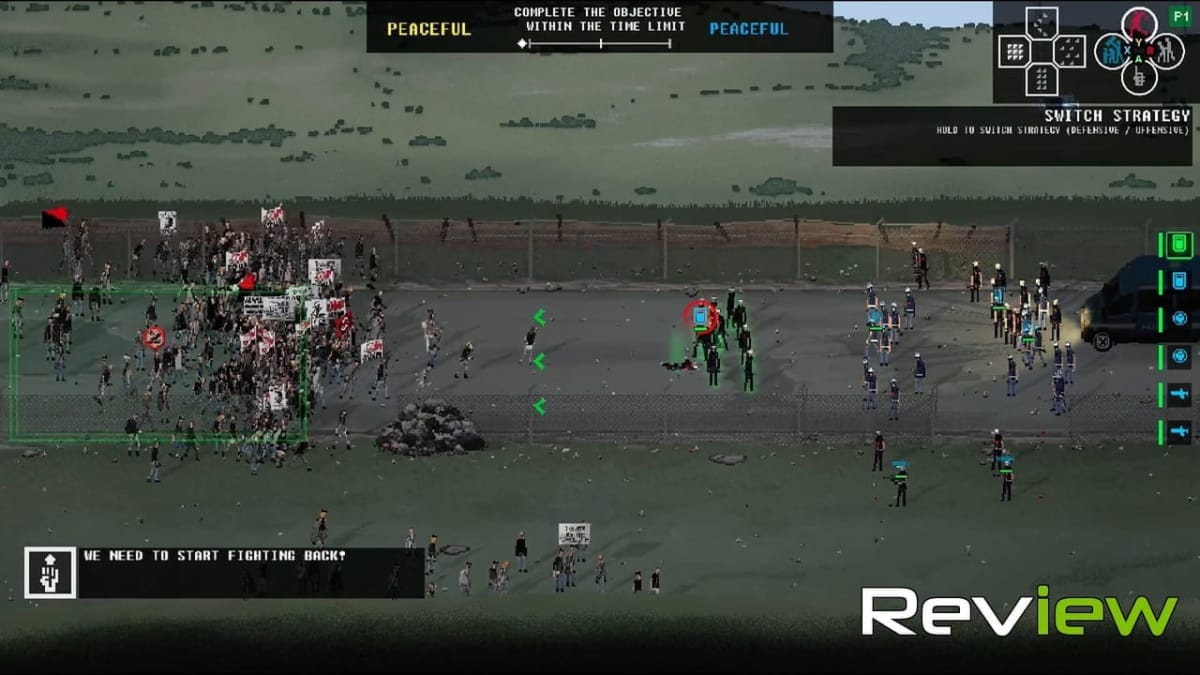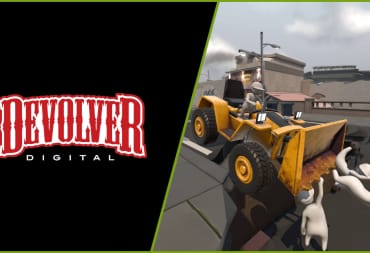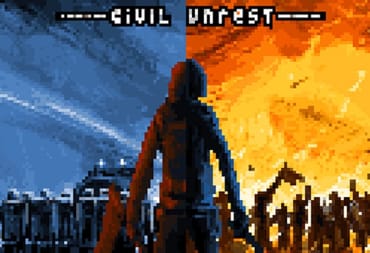About a year ago, I wrote an editorial that discussed modern day politics through the lens of a video game. The center of that conversation, the indie simulation-strategy title Riot – Civil Unrest, is a very stark example of how our world view can sometimes cloud our perceptions of events and feelings. This is especially true in a such a polarizing world, where political beliefs have become tied heavily to personal identity.
Many folks often cry foul when games contain a political slant. Either on purpose or through perception, games have always carried political connotations to them. Riot takes it to a new level of being overtly about modern politics while also attempting to be apolitical. The real power of Riot is that it allows players to make their own choices in the heat of the moment. Now, finally out of beta and with a full commercial release, does that power of choice translate to a product that can provide gameplay with its topical theme?
The simple answer no, for the most part. Riot remains relatively unchanged since its long beta began years ago. The brainchild of Italian developer Leonard Menchiari, inspired by his experiences with the No TAV movement in his home country. Riot has the player choose their side in a full scale riot simulation, either playing as the police or protesters through thirty plus levels spanning across several game modes.
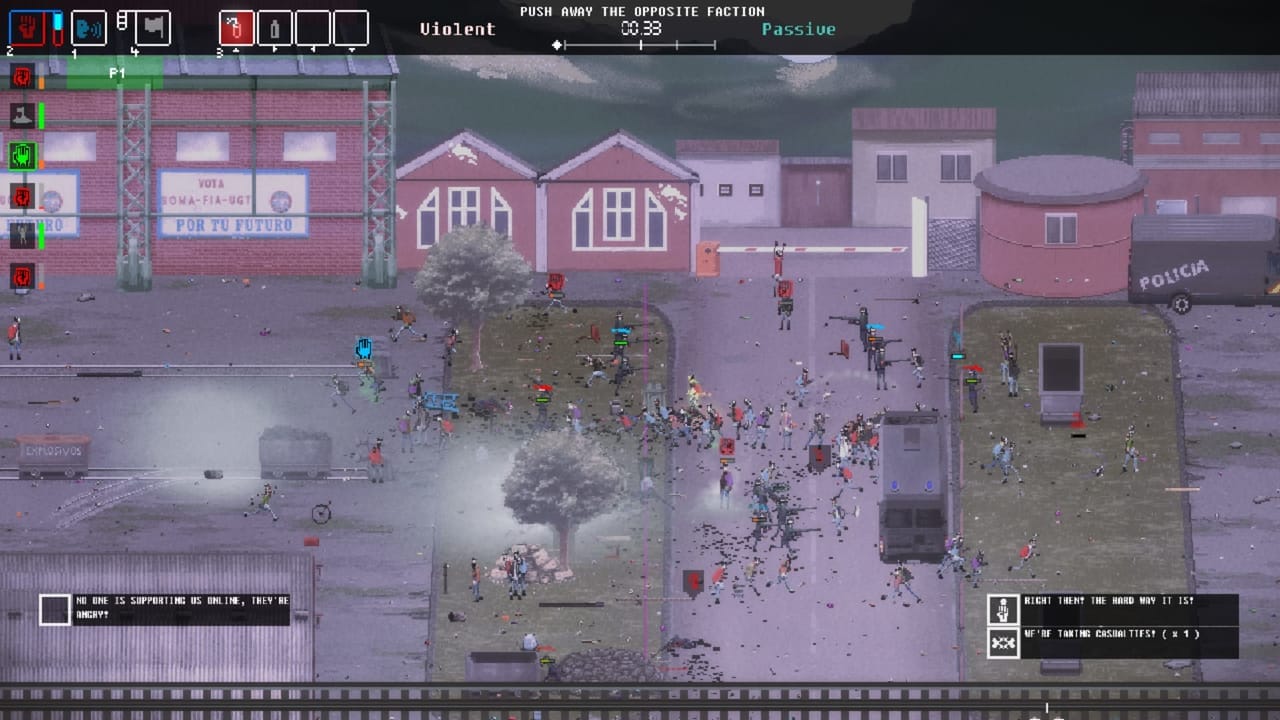
The biggest additions to the retail version of Riot are the modes themselves. The standard campaign features four specific storylines which are playable as either police or protesters. The new global mode adds a long, linear campaign that gets increasingly difficult as time goes on. Players gain objective ranging from occupying spaces to destroying property, all within a certain time limit.
Global mode attempts to string together all the game’s basic scenarios into one long playthrough, with the difficulty of scoring points only escalating depending on how strategic players are. As protestors, most of your goals are to control space and block police, as police, your job is to clear out the mobs through lethal and non-lethal force.
The titular rioting in Riot comes into play as players choose to be aggressive to the opposite side. Multiple weapons and tools factor into their success as well, from using social media and photographs to help sway public opinion, to tear gas, firecrackers, and even live ammunition in more deadly encounters. Both sides also play differently; with the blob of protestors giving numbers an advantage, while the police forces use a careful tactical arsenal to hold their positions.
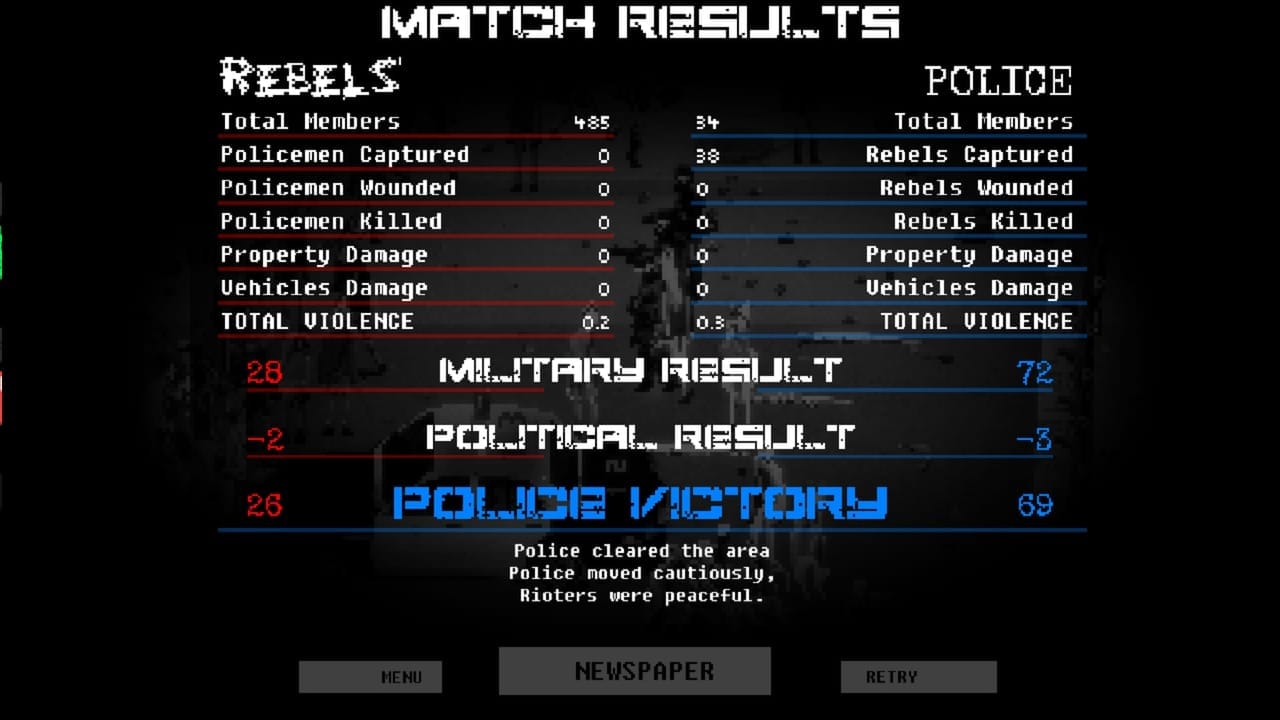
All of this, in the end, factors into the player's final score tally. The better your overall public opinion, the better your score. That is pretty much Riot as a game, the little moments that each scenario provides for the player small mission chunks with singular objectives to follow.
Sadly, it is a bit barebones to really hold much attention. Part of the problem for this is the lack of actual tactics in-game. The AI, while competent, suffers from following the same patterns in each situation. Computer protestors swarm like wasps towards objective markers, while the police overly rely on smoke grenades and shield walls to pacify crowds.
Part of the problem is the bite-sized presentation of each level. Every scenario has a simple objective, with player tactics sometimes limited in what they can do to achieve it. Some levels will require more aggressive or passive choices to win through. The equipment you can bring almost becomes paramount to your success. Especially if public opinion becomes a major factor in continuing through scenarios. So deadly force or more aggressive actions are discouraged, but they're impossible to ignore in most cases.
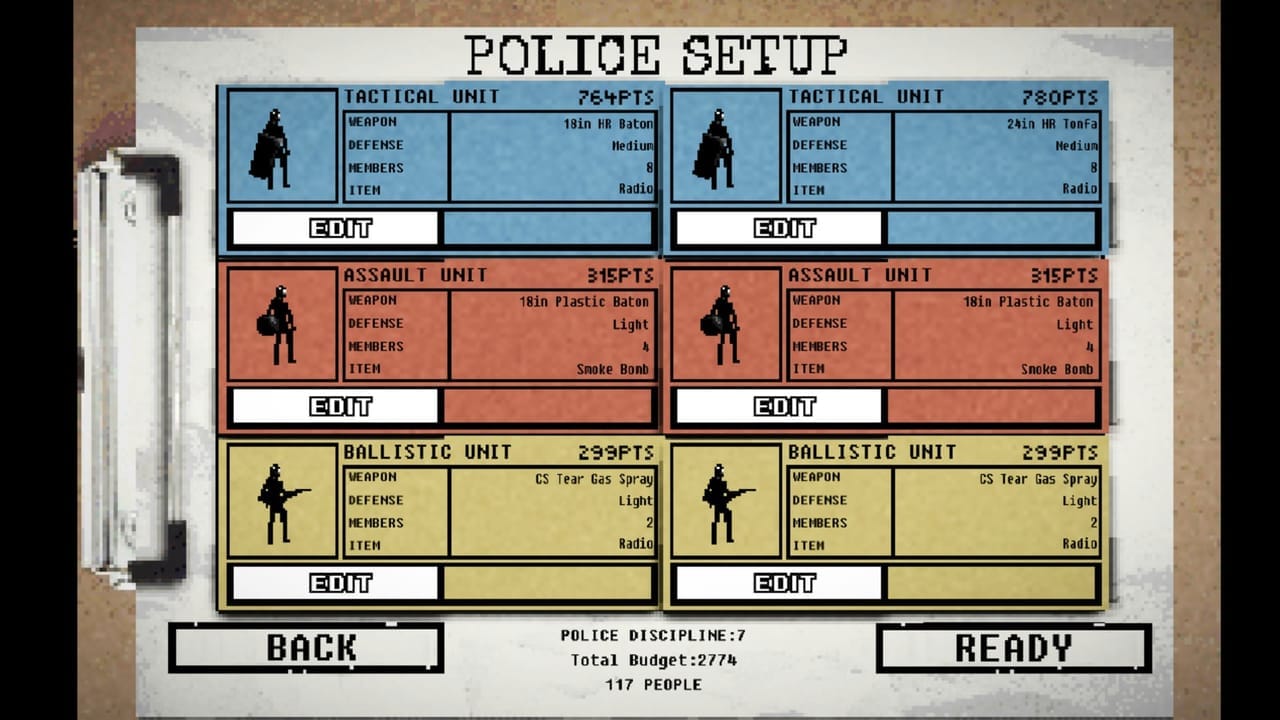
One problem is the recycling of levels throughout all its modes. If you play through the story or global mode, you've pretty much have done everything you can in Riot. Menchiari attempts to mitigate this by adding a custom scenario editor (and support for Steam Workshop on PC). Creating your own scenarios adds some form of longevity. Even if the singular objectives allowed in each level limit the added scenarios.
This also leads to a lot of downtime in the end. Especially when some scenarios take three to five minutes to complete. Players get a lot of leeway to achieve their objectives, but they'll often be able to outmaneuver the AI side. Online versus, when it does have players participating, does make for more challenging gameplay, but ultimately Riot is shallow as a tactical game.
In the end, the real appeal of Riot is its subject matter. Riot is a topical game that shines a beacon in a politically charged world. It allows players to participate in living history. It also importantly allows the player to make their own judgments on the events at hand. The raw emotions of those playing Riot become manifest in the chaos of the action on screen. It forces players to make choices they wouldn’t agree with and plays upon our political perspectives.
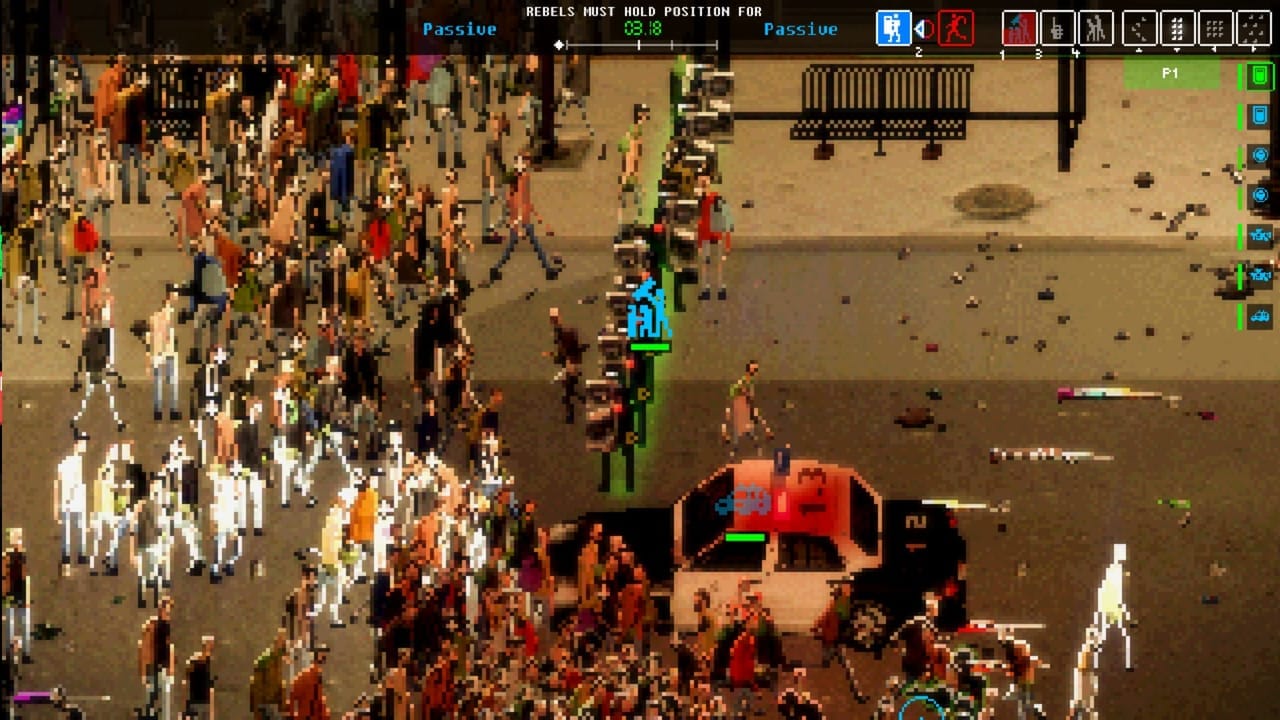
It also helps that the overall presentation enhances the themes further. The 2-D styled pixel graphics, the synthesized rock score by composer Giacomo Langella, the constant sounds of shouts and sirens, Riot's overall presentation helps sell the chaotic mood well. It is a game about the emotions of the player, one that puts aside deep gameplay to provide more of an experience over tight fun.
This really is a textbook example of a game whose themes are better than its gameplay. Of course, that's not necessarily a bad thing, especially considering the strength of Riot's theme. The bulk of the gameplay tries to showcase the base anarchy of the modern day. It strikes back against authority in what can be a lost cause for most. The real question is, are players willing to play along with this intent?
RIOT - Civil Unrest Review | Final Thoughts
That will be the big test for Menchiari’s game. Riot - Civil Unrest is OK as a game but shines at relating a strong personal experience. It relishes in the uncontrolled anarchy of its scenarios despite the shallowness of its gameplay. While it's unlikely to capture your attention for long stretches, Riot is worth a look. Especially for those looking for something different to try.
TechRaptor reviewed RIOT - Civil Unrest on PC via Steam with a code provided by the publisher. The game is also available on the PlayStation 4, Xbox One and Nintendo Switch.
Review Summary
Pros
- Strong Thematic Elements...
- A Number of Real-Life Scenarios...
- Great Use of Sound and Graphics...
Cons
- ...With Mediocre to Poor Gameplay.
- ...Limited Objectives and Variety.
- ...Limited Versus Mode and Scenario Editor.
Have a tip, or want to point out something we missed? Leave a Comment or e-mail us at tips@techraptor.net
